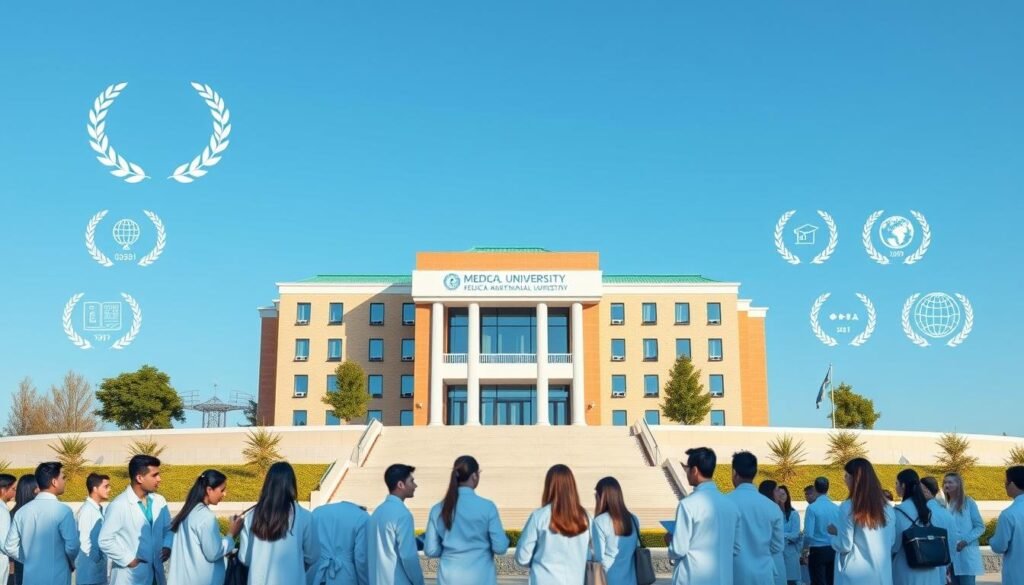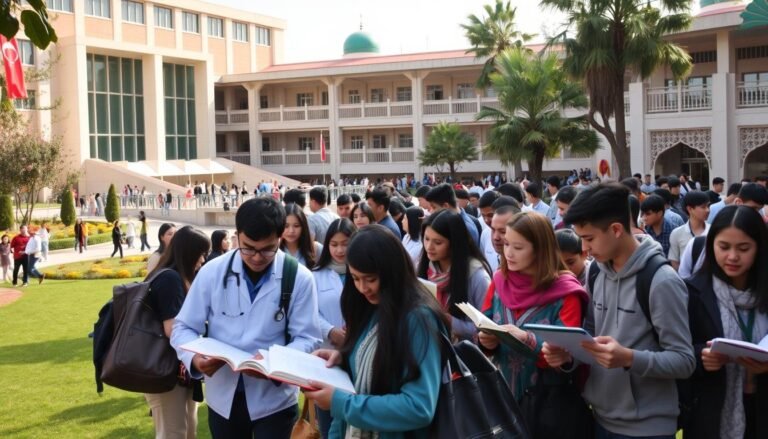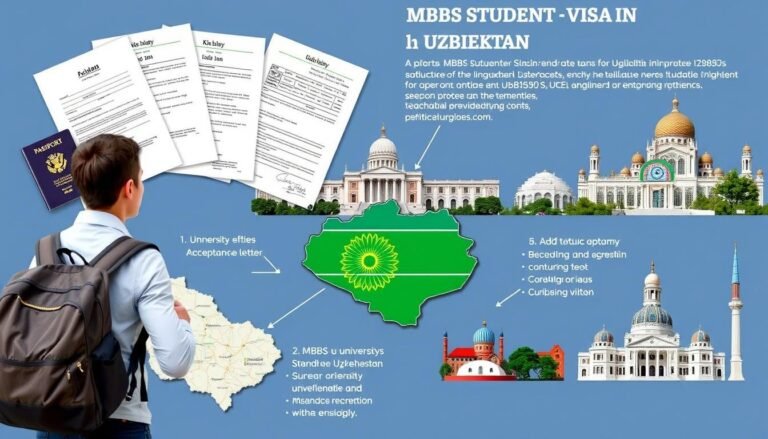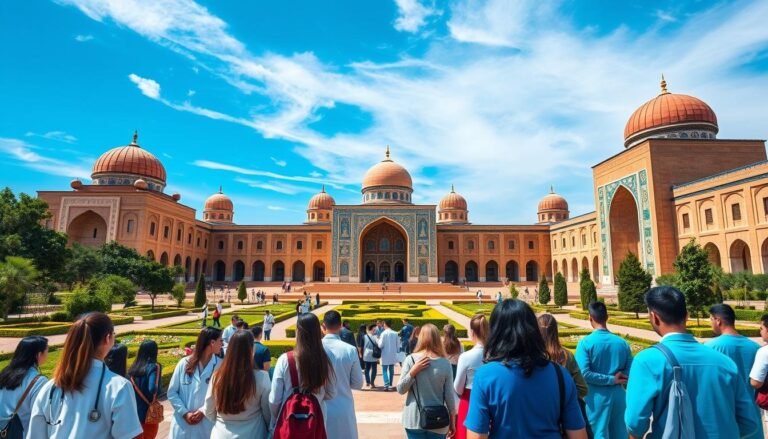Uzbekistan Medical Universities Recognitions and Approvals
Are you considering studying medicine abroad but worried about the recognition of your degree? We’ve got great news for you. Uzbekistan’s medical universities are gaining global recognition, offering a unique blend of quality education and affordability. Let’s explore why these institutions are becoming a top choice for aspiring doctors worldwide.

Uzbekistan has emerged as a hub for medical education, attracting students from various corners of the globe. The country’s medical universities boast accreditation from prestigious bodies like the World Health Organization (WHO) and the Foundation for Advancement of International Medical Education and Research (FAIMER). This mbbs uzbekistan university recognition ensures that your degree will be valued internationally.
One of the key factors drawing students to Uzbekistan is the cost-effective education. With annual tuition fees ranging from $3,200 to $3,500 for MBBS programs, it’s a fraction of what you’d pay in many Western countries. Add to that the low living costs – about $150 per month – and you’ve got an affordable path to your medical dreams.
The uzbekistan medical degree recognition extends beyond just cost savings. These universities offer a 6-year MD Physician course taught entirely in English, making it accessible for international students. Plus, with no additional fees or donations required for admission, the process is transparent and straightforward.
As we delve deeper into this topic, we’ll explore the specific universities, their rankings, and the unique advantages of studying in Uzbekistan. Stay tuned to discover why this Central Asian country might be the perfect destination for your medical education journey.
Understanding MBBS in Uzbekistan
The Uzbekistan medical education system offers excellent opportunities for students seeking MBBS courses in Uzbekistan. With a focus on quality education and international recognition, Uzbekistan’s medical universities are gaining popularity among aspiring doctors worldwide.
Overview of Medical Education in Uzbekistan
MBBS courses in Uzbekistan typically span six years, including a one-year internship. The curriculum is designed to provide a strong foundation in medical sciences and practical skills. Students study theoretical subjects like Anatomy and Biochemistry in the first three years, followed by clinical subjects such as Internal Medicine and Surgery in the fourth and fifth years.
Importance of MBBS Recognition
Uzbekistan’s medical universities are listed in the World Directory of Medical Schools, ensuring global recognition. This enables graduates to pursue careers in countries like the US, UK, Australia, and Canada. The education system prepares students to pass challenging international medical exams, opening doors to prestigious hospitals worldwide.
Study Duration and Structure
The six-year MBBS program in Uzbekistan is structured to provide comprehensive medical training. Top universities like Tashkent Medical Academy and Samarkand State Medical Institute offer English-medium programs. With affordable tuition fees and a low cost of living, Uzbekistan is an attractive destination for international students seeking quality medical education.
| Year | Focus |
|---|---|
| 1-3 | Theoretical subjects (Anatomy, Physiology, Biochemistry) |
| 4-5 | Clinical subjects (Internal Medicine, Surgery, Pediatrics) |
| 6 | Internship |
Key Medical Universities in Uzbekistan
Uzbekistan boasts several top-notch medical universities, offering quality education to aspiring doctors. Let’s explore three prominent institutions that stand out in uzbekistan medical universities ranking.
Tashkent Medical Academy
Tashkent Medical Academy is a leading institution in Uzbekistan’s capital. It provides state-of-the-art facilities and a comprehensive curriculum. The academy focuses on producing skilled medical professionals ready for global challenges.
Samarkand State Medical University
Located in the historic city of Samarkand, this university has a rich heritage. It offers world-class medical training with a blend of traditional and modern approaches. The university attracts students from various countries due to its reputation.
Bukhara State Medical Institute
Established in 1990, Bukhara State Medical Institute has quickly risen in uzbekistan medical universities ranking. It provides excellent education with a focus on practical skills. The institute’s modern facilities prepare students for successful medical careers.
These universities share common features that make them attractive to international students:
- English-medium instruction
- Affordable tuition fees (3,000 – 5,000 USD per year)
- Recognition by WHO and NMC
- 6-year MBBS program (5 years study + 1 year internship)
- Modern infrastructure and facilities
| University | Established | Location | Annual Tuition Fee (USD) |
|---|---|---|---|
| Tashkent Medical Academy | 1920 | Tashkent | 4,500 |
| Samarkand State Medical University | 1930 | Samarkand | 4,000 |
| Bukhara State Medical Institute | 1990 | Bukhara | 3,500 |
Accreditation of Medical Universities
Uzbekistan medical university accreditation involves rigorous national and international processes. These accreditations ensure high educational standards and add credibility to the programs offered.
National Accreditation Processes
In Uzbekistan, medical universities undergo strict national accreditation. This process evaluates the quality of education, facilities, and faculty. The State Inspectorate for Supervision of Quality in Education plays a key role in this accreditation.
International Accreditation and Its Importance
Many Uzbek medical universities seek international accreditation to enhance their global standing. For example, Tashkent Medical Academy became a full member of the Association of European Medical Schools in 2020. This membership allows Uzbek universities to align with European education standards.
| Accreditation Body | Significance |
|---|---|
| Association of European Medical Schools | Ensures conformity with European Higher Education Standards |
| World Federation for Medical Education | Aligns programs with global medical education standards |
| Medical Council of India | Allows Indian students to pursue MBBS in Uzbekistan |
International accreditation brings numerous benefits. It fosters global collaborations, enhances research opportunities, and improves the overall quality of medical education in Uzbekistan. Students graduating from these accredited universities gain a competitive edge in the global healthcare market.
Recognitions by Global Medical Bodies
Uzbekistan medical degree recognition holds significant importance for students pursuing MBBS abroad. We find that many Uzbek medical universities have gained acclaim from prestigious global medical organizations.
WHO Recognition Status
The World Health Organization (WHO) acknowledges several medical universities in Uzbekistan. This recognition ensures that graduates can practice medicine internationally. It validates the quality of education provided by these institutions.
FAIMER and IMED Listings
Uzbek medical schools are listed in key directories like the Foundation for Advancement of International Medical Education and Research (FAIMER) and the International Medical Education Directory (IMED). These listings are crucial for students seeking to practice medicine globally.
| Recognition Body | Significance |
|---|---|
| WHO | Allows graduates to practice internationally |
| FAIMER | Validates educational standards |
| IMED | Facilitates global recognition of degrees |
Uzbekistan’s medical universities also boast accreditations from other esteemed bodies like the National Medical Commission (NMC), ECFMG, and MCC. These recognitions enhance the value of an Uzbekistan medical degree, opening doors for graduates worldwide.
With a 6-year MBBS program duration and English as the teaching medium, Uzbekistan attracts many international students. The country ranks 73rd globally in medical education, offering quality training at affordable rates ranging from $3500 to $4500 per year.
Benefits of Studying MBBS in Uzbekistan
Studying MBBS in Uzbekistan offers numerous advantages for aspiring medical professionals. We’ll explore the key benefits that make Uzbekistan an attractive destination for international students seeking quality medical education.
Affordable Tuition Fees
One of the most appealing aspects of studying MBBS in Uzbekistan is the affordable tuition fees. The cost of medical education in Uzbekistan is significantly lower compared to Western countries. In fact, Uzbekistan offers some of the most budget-friendly MBBS programs globally.
| Aspect | Details |
|---|---|
| Minimum Tuition Fee (with hostel) | ₹14,35,000 |
| Program Duration | 6 years (including 1 year practical training) |
| Entrance Exam | Not required for international students |
| Eligibility Criteria | Minimum 50% in Physics, Chemistry, and Biology aggregate |
Quality of Education
MBBS fees in Uzbekistan universities are affordable, but this doesn’t compromise the quality of education. Uzbekistan medical universities are accredited by prestigious organizations like NMC, WHO, FAIMER, and WFME. This ensures high standards of medical education and global recognition of the degree.
Cultural Diversity and Experience
Studying MBBS in Uzbekistan offers a unique cultural experience. Students from various countries come together, creating a diverse learning environment. This international exposure prepares students for global medical careers. Additionally, Uzbekistan’s affordable cost of living makes it an attractive option for international students on a budget.
Evaluating University Rankings
When considering Uzbekistan medical universities ranking, it’s crucial to understand the criteria used and how they compare globally. Rankings help students make informed decisions about their education and future careers.
Criteria for University Ranking
Rankings for medical universities in Uzbekistan are based on several factors:
- Academic reputation
- Research output
- Faculty qualifications
- Student satisfaction
- Facilities and resources
For example, Tashkent Medical Academy offers programs that take 3-5 years for undergraduate degrees and 1-3 years for master’s degrees. The university provides courses in medicine, surgery, nursing, pediatrics, and psychiatry.
Comparison with Other Countries
While Uzbekistan medical universities may not rank as high as some Western institutions, they offer competitive education at lower costs. Let’s look at some statistics:
| Institution | Total Staff | Top 10% Scientists | Top 70% Scientists |
|---|---|---|---|
| Jizzakh State Pedagogical University | 331 | 10 | 165 |
| Tashkent State University of Economics | 397 | 6 | 110 |
| Bukhara State University | 819 | 3 | 440 |
These numbers show that Uzbekistan universities have a significant number of qualified staff and scientists. With 75 recognized institutions and 6,767 total scientists in the country, Uzbekistan provides a good balance of quality education and affordability for international students seeking medical degrees.
Application Process for International Students
The mbbs admission process in uzbekistan for international students is straightforward. We’ll guide you through the key steps to start your medical journey in this Central Asian country.
Required Documents
To apply for MBBS in Uzbekistan, you’ll need these documents:
- High school transcripts
- Passport copy
- Passport-sized photos
- NEET scorecard (for Indian students)
- Birth certificate
- Medical fitness certificate
Application Timeline
The mbbs admission process in uzbekistan typically follows this schedule:
- Application start: June 15
- Deadline: September 25
- Classes begin: October 25
It’s wise to apply early to increase your chances of admission.
Admission Tests and Interviews
Some universities may require entrance exams or interviews. These assess your academic knowledge and English proficiency. Prepare well to make a strong impression during the mbbs admission process in uzbekistan.
| University | Application Fee | Annual Tuition |
|---|---|---|
| Tashkent Medical Academy | $200 | $5,700 |
| Samarkand State Medical University | $150 | $4,000 |
| Bukhara State Medical Institute | $180 | $3,700 |
Language of Instruction
When studying MBBS in Uzbekistan, language plays a crucial role in your education. English serves as the primary medium of instruction in most medical universities, making it easier for international students to adapt and learn effectively.
English Medium Programs
Medical universities in Uzbekistan offer MBBS programs entirely in English. This approach ensures that international students can fully engage with the curriculum without language barriers. The 5-year MBBS course, followed by a 1-year internship, is conducted in English, allowing students to focus on their medical studies rather than struggling with language issues.
Importance of Language Proficiency
While English is the main language of instruction, proficiency in the local language can be beneficial, especially during clinical rotations and patient interactions. Many universities provide language support programs to help international students improve their communication skills in both English and Uzbek.
| Language Aspect | Details |
|---|---|
| Primary Language of Instruction | English |
| Course Duration | 5 years + 1 year internship |
| Local Language Benefits | Useful for clinical rotations and patient interactions |
| Language Support | Available at most universities |
By offering English-medium programs and language support, Uzbekistan’s medical universities create an inclusive environment for international students studying MBBS in Uzbekistan. This approach ensures that language barriers do not hinder your medical education journey.
Post-Graduation Opportunities
Uzbekistan medical graduates career prospects are promising and diverse. After completing their MBBS in Uzbekistan, students have numerous options for professional growth and advancement in the medical field.
Licensing and Practice in Different Countries
Graduates from Uzbekistan medical universities can pursue careers worldwide. To practice in countries like India, they must pass mandatory medical screening tests. Many universities offer training and guidance for licensing exams such as FMGE and USMLE, enhancing the global employability of their graduates.
Residency and Specialization Options
Upon completion of their MBBS program, graduates have various residency and specialization options. These opportunities allow them to further their expertise in specific medical fields. The standard MBBS course in Uzbekistan lasts about five years, followed by a one-year internship program, providing a solid foundation for advanced studies.
- Specializations in various medical fields
- Opportunities for research and academic careers
- Potential for international residency programs
With world-class infrastructure, modern facilities, and a curriculum recognized by major medical bodies like WHO and NMC, Uzbekistan medical graduates are well-prepared for successful careers in the global healthcare industry.
Scholarships and Financial Aid
We understand that mbbs fees in uzbekistan universities can be a concern for many students. Fortunately, there are various financial aid options available to help offset these costs.
Available Scholarships for Foreign Students
Several universities in Uzbekistan offer scholarships to international students pursuing MBBS degrees. For example, Fergana Medical Institute of Public Health provides scholarships covering up to 80% of tuition and hostel fees. These opportunities can significantly reduce the financial burden of studying abroad.
Funding Opportunities
Aside from scholarships, there are other ways to manage mbbs fees in uzbekistan universities:
- Merit-based financial aid programs
- Work-study options on campus
- Educational loans from home country banks
- Grants from international organizations
To give you a clearer picture of the costs involved, here’s a breakdown of typical expenses for MBBS students in Uzbekistan:
| Expense Type | Cost (Per Year) |
|---|---|
| Tuition Fees | $2,000 – $5,000 |
| Hostel Fees | $600 (at top universities) |
| Living Costs | INR 120,000 – 156,000 |
We encourage prospective students to research and apply for various funding options to support their medical education in Uzbekistan. Remember, investing in your education is investing in your future.
Student Life in Uzbekistan
Studying MBBS in Uzbekistan offers a unique blend of academic rigor and cultural immersion. With 15 NMC-approved medical colleges, international students find themselves in a vibrant educational landscape. The country’s medical universities provide state-of-the-art facilities to support learning and research.
Campus Facilities and Resources
Uzbekistan’s medical institutions boast modern campuses equipped with cutting-edge resources. Students have access to extensive libraries, well-equipped laboratories, and e-learning platforms. These facilities ensure a comprehensive learning experience for those studying MBBS in Uzbekistan.
| Facility | Description |
|---|---|
| Libraries | Extensive collections of medical texts and journals |
| Laboratories | State-of-the-art equipment for practical training |
| E-learning Platforms | Digital resources for remote and self-paced learning |
| Student Counseling | Services to support mental well-being |
Social and Cultural Activities
The multicultural environment in Uzbekistan enriches the MBBS experience. Students engage in various social events and cultural programs that celebrate local traditions. This immersion helps international students adapt to Uzbek culture while pursuing their medical education.
With approximately 2000 Indian students currently studying MBBS in Uzbekistan, the country offers a supportive community for international learners. The blend of Asian, Persian, and Russian cultures creates a unique social atmosphere, allowing students to participate in local festivals and broaden their cultural horizons.
Testimonials from Alumni
We’ve gathered inspiring stories from Uzbekistan medical graduates about their career prospects. These accounts shed light on the quality of education and the global recognition of Uzbek medical degrees. Let’s dive into some success stories and experiences of studying in this vibrant Central Asian nation.
Success Stories
Dr. Akmal Rakhimov, a radiology specialist from Uzbekistan, stands out as a shining example of success. After completing his medical education in Uzbekistan, he pursued advanced training at Asan Medical Center (AMC) in Korea. Dr. Rakhimov now works at the National Medical Emergency Central Hospital in Tashkent, a 250-bed facility specializing in emergency medicine. His role extends to overseeing emergency medical centers across 13 regions, showcasing the high-level positions Uzbekistan medical graduates can attain.
Experiences of Studying in Uzbekistan
Many alumni report spending about 80% of their time within the university during their studies, immersing themselves in a rich learning environment. The curriculum often includes practical experiences, mirroring Dr. Rakhimov’s training at AMC where he engaged in weekly discussions on complex image interpretation cases. This hands-on approach prepares Uzbekistan medical graduates for successful career prospects in various international settings.
Uzbekistan’s medical education system also fosters cultural exchange. Like Dr. Rakhimov’s experience in Korea, many students have the chance to explore historical sites and engage in cultural activities alongside their studies. This blend of rigorous academic training and cultural exposure equips Uzbekistan medical graduates with a well-rounded skill set, enhancing their career prospects on the global stage.





